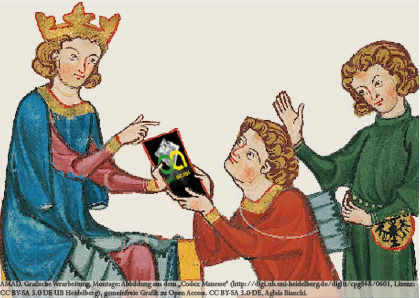AMAD
"Archivum Medii Aevi Digitale - Specialized open access repository for research in the middle ages"To submission

Full metadata record
| DC Field | Value | Language |
|---|---|---|
| Contributor | Université Paris-Sorbonne ( UP4 ) -Centre National de la Recherche Scientifique ( CNRS ) | - |
| Contributor | Philosophie, Langages et Cognition ( PLC ) | - |
| Contributor | Université Pierre Mendès France - Grenoble 2 ( UPMF ) | - |
| Contributor | Groupe d'étude des méthodes de l'analyse sociologique ( GEMAS ) | - |
| Author | Raynaud , Dominique | - |
| Date | 2008 | - |
| Other Identifier | https://halshs.archives-ouvertes.fr/halshs-00479820 | - |
| Other Identifier | https://halshs.archives-ouvertes.fr/halshs-00479820/document | - |
| Other Identifier | https://halshs.archives-ouvertes.fr/halshs-00479820/file/Mathematisation_perspective-ESM.pdf | - |
| URI | https://www.amad.org/jspui/handle/123456789/108759 | - |
| Description | to be published in Early Science and Medicine (accepted 26 Oct. 2009) ; The debates on the foundations of linear perspective from Piero della Francesca to Egnatio Danti. A case of upside down mathematisation. The rise of linear perspective caused many polemics throughout quattrocento and cinquecento, opposing the supporters of artificial geometrisation of sight to those who were praising the qualities of the drawing according to nature, or were invoking some arguments on physiological basis. These debates can be recalled starting from the four alternatives that form the hard core of them: restricted vs. broad field of vision, ocular immobility vs. mobility; curvilinear vs. planar picture, monocular vs. binocular vision. By retaining the first terms of these four alternatives, the history of perspective eliminated many heterodox constructions. From the mathematisation viewpoint, the interest of these debates is that they have succeeded, not preceded, the adoption of perspective system, defined by the intersection of the visual pyramid. Thus the history of linear perspective constitutes a genuine case of a posteriori justification of foundations or so to speak: an upside down mathematisation. ; L'essor de la perspective linéaire a suscité de nombreuses polémiques tout au long du Quattrocento et du Cinquecento, opposant les partisans d'une géométrisation artificialiste de la vision à ceux qui vantaient les qualités du dessin d'après nature ou invoquaient des arguments de nature physiologique. Ces débats peuvent être retracés à partir des quatre alternatives qui en constituent le noyau dur : champ de vision restreint vs. large ; immobilité vs. mobilité oculaire ; tableau plan vs. curviligne ; vision monoculaire vs. binoculaire. En retenant les premiers termes de ces quatre alternatives, l'histoire de la perspective a rejeté de nombreux systèmes hétérodoxes. Du point de vue de la mathématisation, l'intérêt de ces débats tient à ce qu'ils ont succédé, et non précédé, l'adoption du dispositif perspectif comme intersection de la pyramide visuelle. L'histoire de la perspective linéaire offre ainsi un authentique cas de justification a posteriori des fondements ou, pour ainsi dire, de mathématisation à rebours. | - |
| Language | fre | - |
| Rights | info:eu-repo/semantics/OpenAccess | - |
| Keywords | Linear perspective | - |
| Keywords | Geometry | - |
| Keywords | XVth-XVIth centuries | - |
| Keywords | Mathématisation | - |
| Keywords | géométrie | - |
| Keywords | perspective linéaire | - |
| Keywords | XV-XVIe siècles | - |
| Keywords | [ SHS.HISPHILSO ] Humanities and Social Sciences/History | - |
| Keywords | Philosophy and Sociology of Sciences | - |
| Dewey Decimal Classification | 940 | - |
| Title | Les débats sur les fondements de la perspective linéaire de Piero della Francesca à Egnatio Danti : un cas de mathématisation à rebours | - |
| Type | info:eu-repo/semantics/preprint | - |
| Type | Preprints, Working Papers, . | - |
| AMAD ID | 664984 | - |
| Year | 2008 | - |
| Open Access | 1 | - |
| Appears in Collections: | BASE (Bielefeld Academic Search Engine) General history of Europe | |
Files in This Item:
There are no files associated with this item.
Items in DSpace are protected by copyright, with all rights reserved, unless otherwise indicated.

